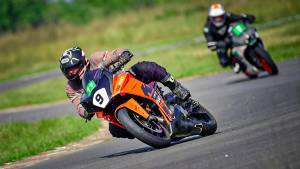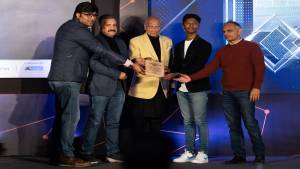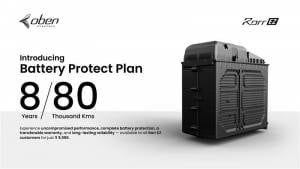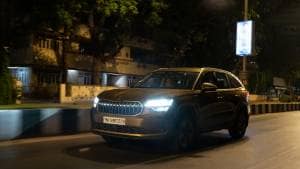Total Competition: The greatest rivalries at the Le Mans 24
I love Le Mans. I love everything about it. I love the way the somewhat sleepy town of Sarthe suddenly wakes up one morning and transforms itself into one of the greatest race tracks in the world. I love the way motorsport teams with cutting-edge racing technology and race cars worth millions (of dollars and man hours) descend on the town to battle it out side by side. I love the way motorsport fans from all over the world come flocking, to see their racing heroes perform what is a feat of endurance unlike any other in the world. And I love it for being the extravaganza - there's no other word for it - that it is! On the one hand there's some of the closest racing in the world that goes on for 24 hours non-stop. And on the other, there's a raging party that seems to go on for just as long. And, when I'm far away, cosily tucked into my bed at home, I find myself thinking fondly of my time at the Le Mans media centre. After all, when one is comfortable, well-rested, and well-fed, the zombie-like existence of the average motorsport journalist at Le Mans doesn't seem so bad after all. But most of all I love Le Mans for its ability to produce great racing and terrific motorsport stories.
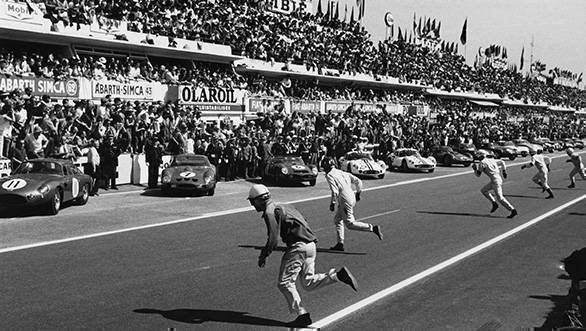 The traditional Le Mans start
The traditional Le Mans start
Which is also why Le Mans has left me somewhat disappointed the past two years. Sure, there have been some great battles going on up and down the order. Yes, cars have come screaming out of Indianapolis and headed towards Arnage with as much enthusiasm as always. And heartbreak, hope, hubris and a myriad other emotions have been on display.
But there's also the fact that the LMP1 category has been something of a damp squib. Two factory Toyotas battling a handful of privateers? Meh. And now there's the rather disheartening prospect of yet another Le Mans of this sort in approximately 10 months' time, and a further one year to wait before we see the new Le Mans HyperCar Prototypes take to the Circuit de la Sarthe. What better way to ward off our despondence, than by taking a look at some of the more interesting battles for supremacy that have been waged at the French track in the past.
FORD VS FERRARI: GO LIKE HELL
This is one of the most iconic Le Mans battles of all time. So iconic that it inspired the book Go Like Hell: Ford, Ferrari and their battle for speed and glory at Le Mans by AJ.Baime. It's also attracted the bright lights of Hollywood with a movie called Ford v. Ferrari, (starring Christian Bale as Ken Miles and Matt Damon as Carroll Shelby) set to release later this year. It's really no wonder, given that it's such a terrific story, with Henry "The Deuce" Ford and Enzo Ferrari's game of chess serving to get the battle going. Back in the early 1960s, Ferrari absolutely ruled Le Mans, winning there every single year. Henry Ford II had made an offer to buy Ferrari, which Enzo Ferrari had agreed to. Until he realised that the merger would mean he no longer had control over Ferrari's motorsport programme, which didn't go down well with him. Ferrari reneged. Ford was incensed. He barked orders out to his executives apparently yelling, "Build me a car that will crush Ferrari at Le Mans!"
 After two unsuccessful years, the Ford GT40 won Le Mans in 1966. The American manufacturer locked out the podium, and effectively ended Ferrari's domination at the event
After two unsuccessful years, the Ford GT40 won Le Mans in 1966. The American manufacturer locked out the podium, and effectively ended Ferrari's domination at the event
And while the brief might have been simple, actually building a Ferrari-beater specifically for the Le Mans 24 was quite complicated. Especially since they had only 10 months to do it. It led to the birth of the Ford GT40. Three GT40s went to the 1964 Le Mans 24. Two retired with gearbox issues, and the third caught fire. Ahead of the 1965 season, Ford brought in Miles to help sort the car out. But since they were, once again, short on time, the results at Le Mans left a lot to be desired. Not a single Ford crossed the finish line at the end of the race. And then came the 1966 season, when fortune finally favoured Ford. The GT40 Mk.IIs were so dominant, that the Ford team locked out the Le Mans podium and the Ferraris all fell by the wayside. It was the beginning of Ford's Le Mans domination. They'd continue to win there until 1969, when Jackie Ickx so famously went from last, having refused to participate in the dangerous Le Mans start, to crossing the finish line first.
PORSCHE VS FERRARI: THE BIRTH OF THE 917
It is impossible to think of the Le Mans 24 without thinking of Porsche. Or without, at once, conjuring up images of that most iconic of all race cars, the Porsche 917. Whether you picture the 917 in red and white stripes, or in Martini Racing livery, or in evocative blue and orange Gulf Racing colours, it doesn't matter. They're all iconic. They all left their mark on the sport. And they're all part of the reason that the Porsche name is as revered as it is at the greatest 24-hour race of all time.
 The Porsche 917K, piloted by Hans Herrmann and Richard Attwood won Le Mans in 1970. It was the first of Porsche's 19 wins at the event
The Porsche 917K, piloted by Hans Herrmann and Richard Attwood won Le Mans in 1970. It was the first of Porsche's 19 wins at the event
But the first of Porsche's wins at Le Mans, which came back in 1970, is probably the most significant of them all. Their main rivals at the Le Mans 24 that year were the Ferrari 512s. But the weather at the Circuit de la Sarthe, that year, was awful. Rain came down in buckets, visibility was poor, and the circuit was slippery. So slippery, that two of the Ferrari entries got in an accident that meant they took each other out of the race. It left the way clear for the Porsche Salzburg team's Hans Herrmann and (a rather ill - he later found out he had mumps) Richard Attwood to take victory in the 917K. Behind them, the Martini International Racing team's 917L, piloted by Gerard Larrousse and Willi Kauhsen finished second. And third place went to Helmut Marko and Rudi Lins in a Porsche 908/2LH. The best Ferrari would do no better than fourth.
JAGUAR VS PORSCHE: ENDING ZUFFENHAUSEN'S LE MANS DOMINATION
Porsche is the winningest manufacturer at Le Mans. Since that first win in 1970, they have gone on to win 18 more times. Their most significant period of success at Le Mans began in the 1980s. In 1981, Jacky Ickx and Derek Bell drove a Porsche 936 to victory at Le Mans, kicking off a 7-year streak of success. After that win in 1981, the Porsche 956 would win Le Mans four consecutive times, and the Porsche 962C would win twice after that.
![]() Another iconic Le Mans livery - the Silk Cut Jaguar XJR-9. The car brought an end to Porsche's stranglehold on Le Mans in the 1980s
Another iconic Le Mans livery - the Silk Cut Jaguar XJR-9. The car brought an end to Porsche's stranglehold on Le Mans in the 1980s
In 1987, Jaguar brought their XJR-8 down to Le Mans. The car had already established itself as a race winner and was extremely successful in the World Sports Prototype Championship, having won races at Silverstone, Nurburgring and Spa. But at Le Mans, things fell apart. Two of the three cars failed to finish, and the lone survivor could do no better than fifth. The defeat stung. Jaguar updated the car for the 1988 season of racing, and the XJR-9 took to the Circuit de la Sarthe the following year.
![]() 1988 Jaguar XJR-9 Winners Le Mans
1988 Jaguar XJR-9 Winners Le Mans
Even though the Porsches outperformed the Jaguars in qualifying, the XJR-9 was very fast during the actual race. By the end of the second lap, the car was in the lead, having overtaken the Porsches. Ultimately Jaguar drivers Jan Lammers, Johnny Dumfries and Andy Wallace stormed to the top step of the podium. The XJR-9 had beaten the Porsche 962C, and ended their stranglehold on the 24-hour race. Porsche would have to wait till 1996 for their next overall win.
JAGUAR VS MERCEDES: THE TRAGIC LE MANS DISASTER
Long before Jaguar's 1988 Le Mans win, the manufacturer had exerted some amount of domination at the Circuit de la Sarthe soon after WWII. In the 1950s, Le Mans saw Jaguar along with Ferrari and Mercedes claiming outright victories at the big race. The Jaguar XK-120C won in 1951, largely without any real competition. The following year the Mercedes-Benz W194 won at Le Mans, although Jaguar didn't compete. The subsequent year when the Jaguar Type C won Le Mans Mercedes wasn't on the grid. Although competition came in the form of the Scuderia. In fact, it was Ferrari who would win in 1954, a year in which all three manufacturers competed and waged war against each other on track. 1955 was meant to be the big one. Another year where all three manufacturers were going to battle hard for overall victory.
 Jaguar D Type Ecurie Ecosse 1957 Le Mans winner, Flockhart-Bueb
Jaguar D Type Ecurie Ecosse 1957 Le Mans winner, Flockhart-Bueb
During practice, it seemed like the three were somewhat equally matched for pace. During the race, Eugene Castellotti put his Ferrari 121LM in the lead early on, with Mike Hawthorn in the Jaguar D-Type in hot pursuit. Juan Manuel Fangio, in the Mercedes 300 SLR that he shared with Stirling Moss, overcame a slow start (his pant leg had gotten caught on the gear lever) and soon caught up with the leaders. When Castelloti made a mistake after the first hour, the Jaguar led Le Mans with the Mercedes chasing after it. It was a glorious battle, with the lap record, ultimately claimed by Hawthorn, broken ten times within the first two hours of the race. But then, during the race's 35th lap, disaster struck. Hawthorn, having received instructions that he needed to pit, braked suddenly. Lance Macklin, in the Austin-Healey that he'd just overtaken, braked hard too and briefly lost control of his car. This unfortunately put him right in the path of the 300 SLR of Pierre Levegh. Levegh's car ended up climbing over the rear left of Macklin's car, was then thrown up into the air, and flung into the embankment between the spectators and the track. Levegh perished in the crash, and flying debris from the car killed more than 80 spectators. Mercedes waited for instructions from Stuttgart which arrived around midnight, before withdrawing their two remaining cars, running in first and third at that point, from the race. The Jaguar D-Type of Hawthorn and Ivor Bueb would eventually claim victory.
AUDI VS PEUGEOT: THE ULTIMATE DIESEL BATTLE
Audi was a force to reckon with at Le Mans in the early aughts. The Audi R8 won Le Mans in 2000, 2001 and 2002, before being dethroned by the Bentley Speed 8. It would come back and win two more editions of the 24 Hours of Le Mans, before finally being replaced by the Audi R10 TDI. The diesel-powered R10 won three editions of the race starting in 2006.
 Frank Biela, Marco Werner, Emanuele Pirro (Audi R10) 24h Le Mans 2006
Frank Biela, Marco Werner, Emanuele Pirro (Audi R10) 24h Le Mans 2006
In 2007, though, another diesel-engined machine emerged - the Peugeot 908 HDi FEP. In its first Le Mans outing, it finished second. In 2008, while Audi won yet again, the Peugeot 908 crew took second and third position. In 2009, for the third straight year, Peugeot's Stephane Sarrazin claimed pole position at Le Mans. But this time around, fortunately for Peugeot, the Audis couldn't match them for pace over the course of the race.
 The Peugeot 908 HDi FEP that put an end to Audi's winning streak in 2009
The Peugeot 908 HDi FEP that put an end to Audi's winning streak in 2009
The No. 9 Peugeot of David Brabham, Marc Gene and Alexander Wurz would take victory, with Sarrazin, Sebastien Bourdais and Franck Montagny finishing second. Audi's Tom Kristensen, Allan McNish and Rinaldo Capello would finish third. The much longed for victory in 2009 was Peugeot's only Le Mans win during their comeback. There are plenty more exciting battles that Le Mans has witnessed. In recent times, Porsche's Le Mans return and resurgence comes to mind.
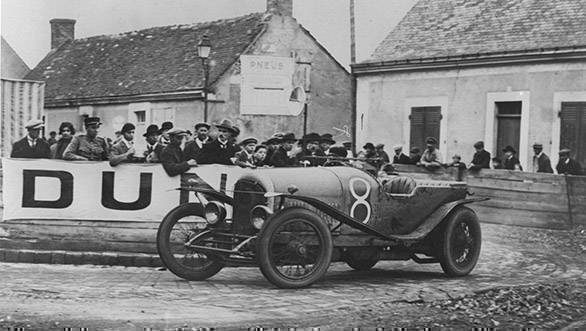 The original Bentley Boys, Capt. John Duff and Frank Clement piloting their Bentley 3-litre Sport at Le Mans in 1923. It would be a few years before Bentley began winning back-to-back Le Mans
The original Bentley Boys, Capt. John Duff and Frank Clement piloting their Bentley 3-litre Sport at Le Mans in 1923. It would be a few years before Bentley began winning back-to-back Le Mans
In earlier times, before WWI, Alfa Romeo and Bentley stamped their authority on Mulsanne Straight. And there have been a few surprise winners here and there. Take, for example, the feat that Jean Rondeau performed in 1980 when he beat the factory Porsches in a car that he built himself - the Rondeau M379B Ford-Cosworth. And it's the Rondeau that gives me hope that despite my cynicism, and despite the might of the factory Toyotas, we just might see a privateer win Le Mans in 2020. After all what better story is there in motorsport than an underdog coming in and proving to be an upset. And Le Mans certainly could do with a good story right about now.
Images: Press websites & Newspress.co.uk
Starts Rs 2.55 Crore
5204cc
Automatic
610
530
7.63 Kmpl
Starts Rs 1.11 Crore
2993cc
Automatic
305
689
-NA-
